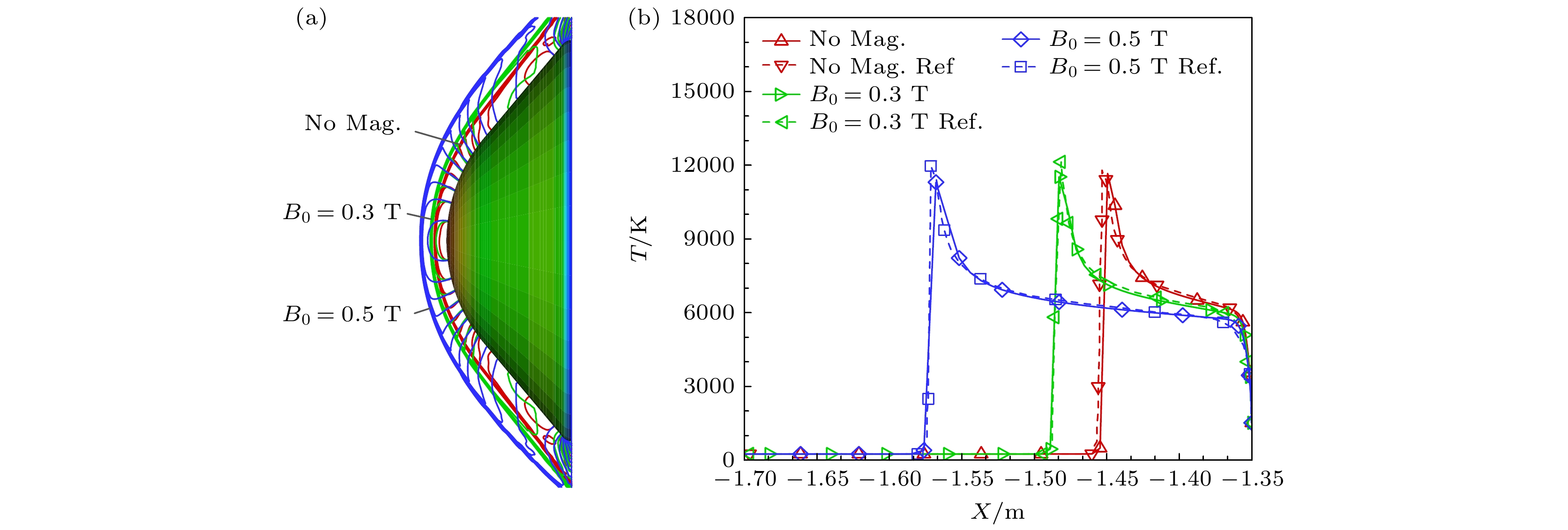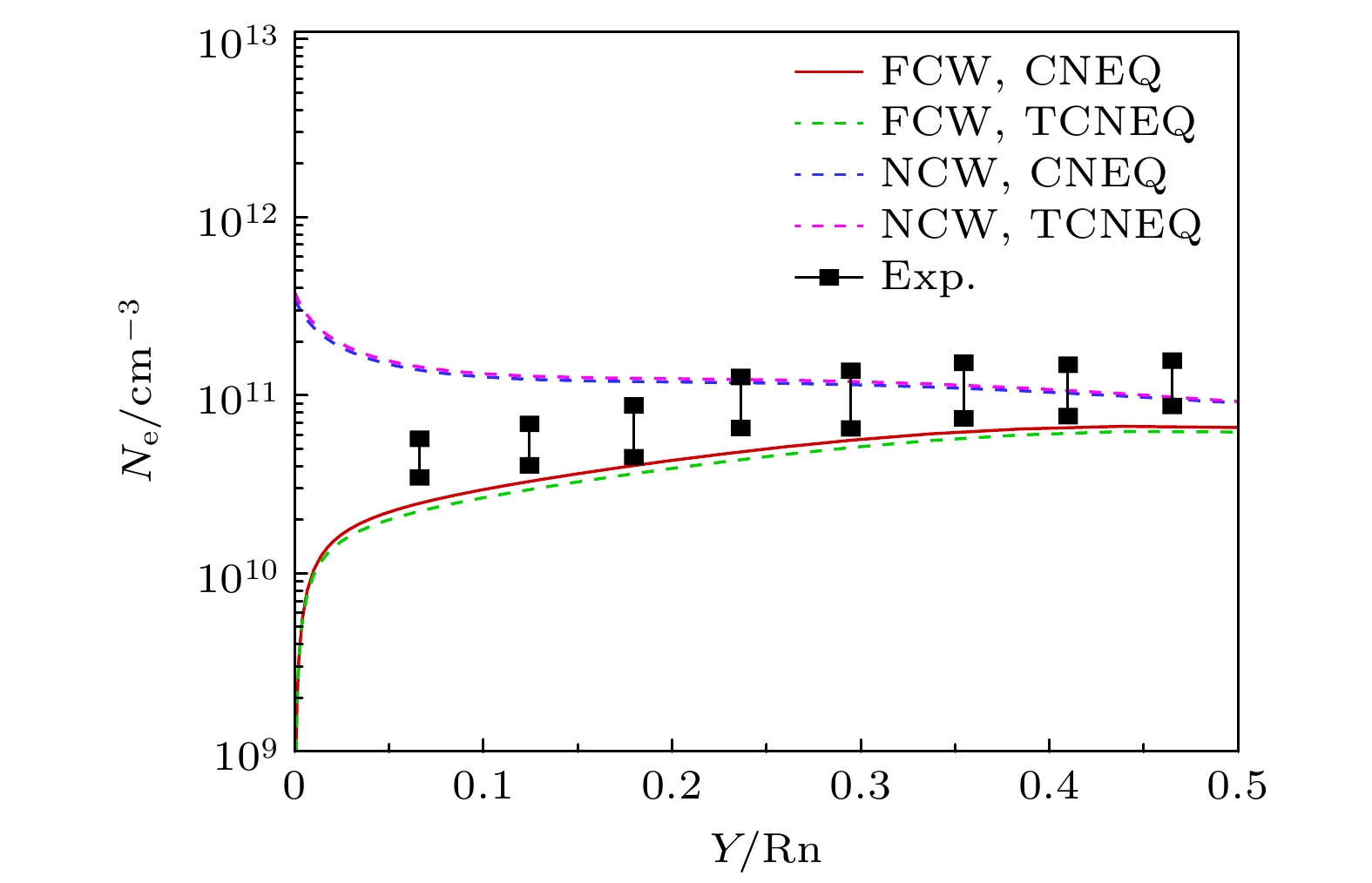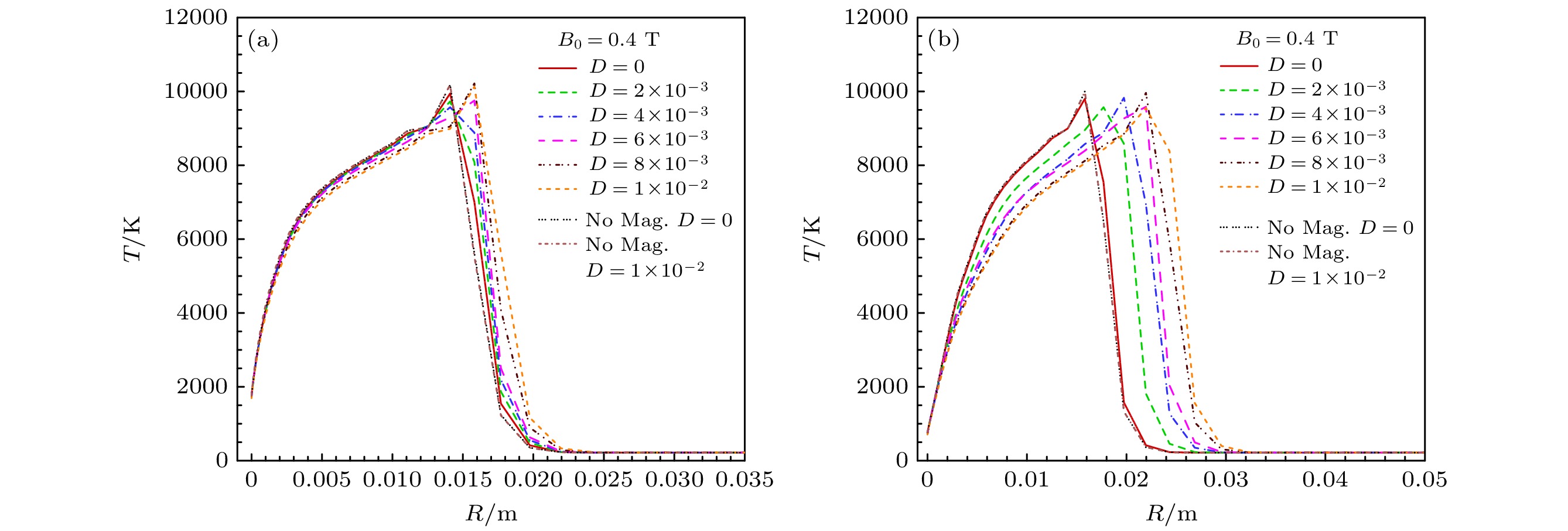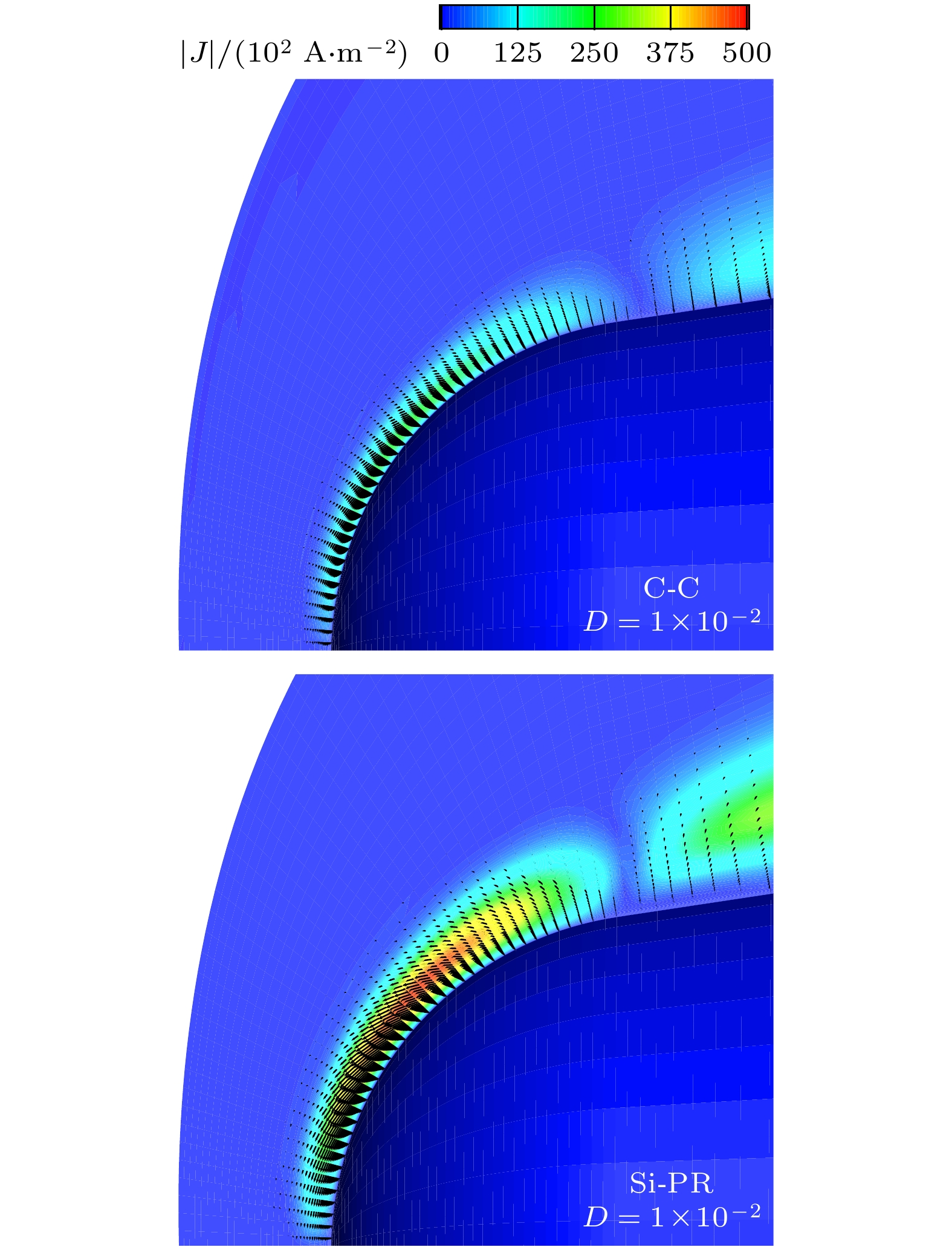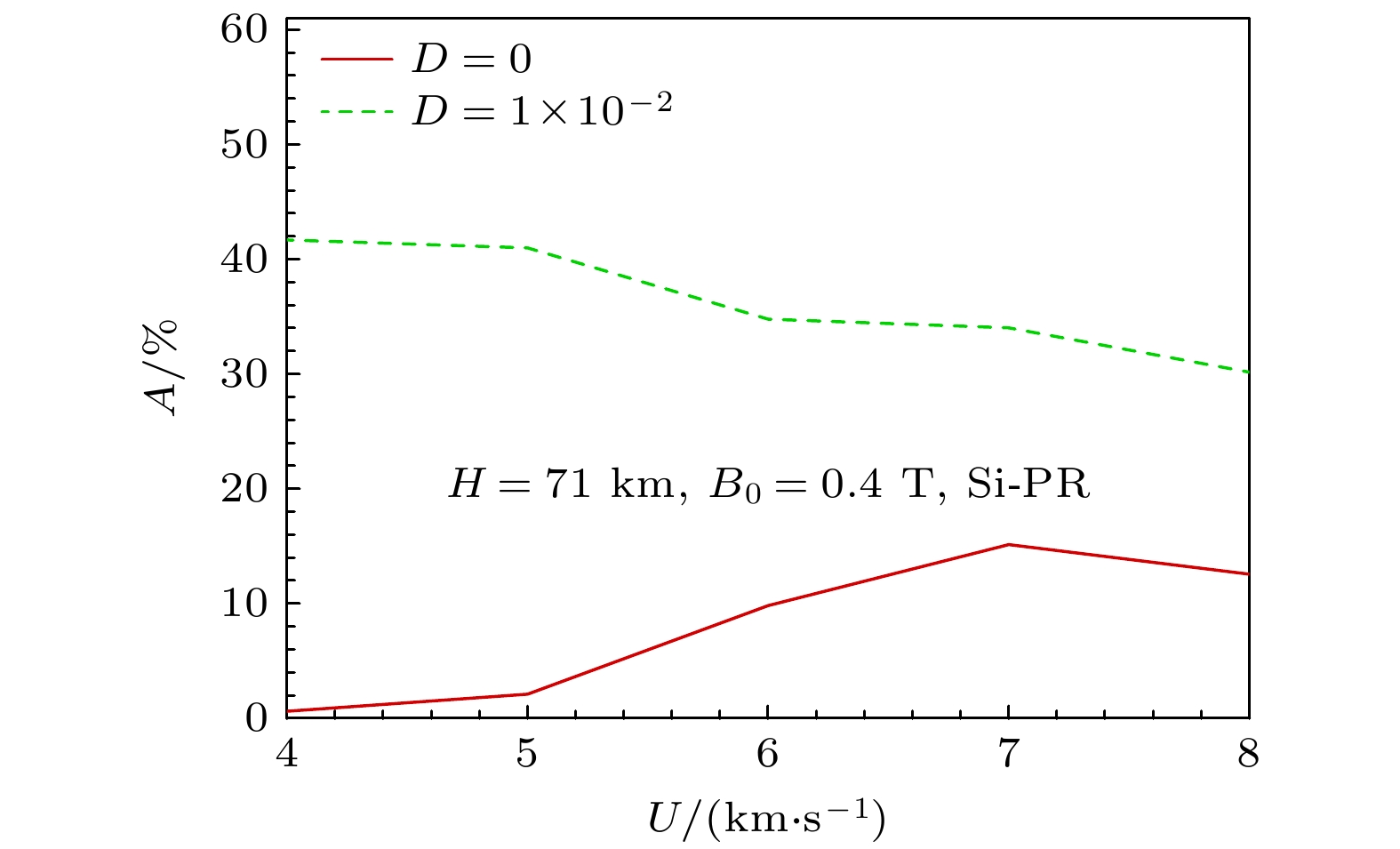-
表面烧蚀显著影响高速流动中等离体子鞘分布及其与电磁场相互作用的特征. 考虑高超声速飞行器表面烧蚀引射机制、烧蚀产物参与流场等离子体生成过程、含碱金属的混合电离气体导电机理和电磁动力学机制, 通过耦合求解带电磁源项的三维热化学非平衡流动控制方程、电场泊松方程和磁矢量泊松方程, 建立了含碱金属烧蚀的高速流动/等离子体/电磁场耦合计算方法, 结合常见的碳碳材料和硅基酚醛树脂材料烧蚀热解过程, 较为系统地开展了多种条件下表面烧蚀对高超等离子体鞘影响及其与电磁场相互作用的机制与规律研究. 研究表明: 烧蚀效应对流场等离子体分布的影响受烧蚀质量引射率和碱金属质量占比共同作用, 当碱金属含量较高时, 碱金属电离反应占主导, 电子数密度可增大1—2个数量级; 不同材料烧蚀对等离子体的影响存在差别, 硅基酚醛树脂的烧蚀质量引射率较大, 电离生成CO+, C+的摩尔分数接近空气主要电离组分NO+,
${\mathrm{O}}_2^+ $ , 其影响不容忽视; 烧蚀材料中碱金属可以显著提升磁流体力学控制效果, 随着碱金属占比增大, 电磁场耦合作用效果增强, 二者呈非线性关系; 在速度较低时, 纯空气本身的电离度低导致电磁场耦合作用效果弱, 通过含碱金属烧蚀来提升电磁作用效果的效率更高.Surface ablation significantly affects the distribution of plasma in high-speed flow and the characteristics of its interaction with electromagnetic fields. Considering the mechanism of ablation and ejection on the surface of hypersonic vehicle, the participation of ablation products in the plasma generating process in the flow field, the conduction mechanism of mixed ionized gas containing alkali metal and the electromagnetic dynamics mechanism, the coupled calculation method of high-speed flow/plasma/electromagnetic field with alkali metal ablation is established by solving the three-dimensional thermochemical non-equilibrium flow governing equation with electromagnetic source term, the electric field Poisson equation and the magnetic vector Poisson equation. Combined with the common ablation and pyrolysis process of carbon-carbon materials and silicon-based phenolic resin materials, the mechanism and law of the interaction between surface ablation and electromagnetic field on the hypersonic plasma sheath under various conditions are systematically studied. The results show that the ablation effect affects the plasma distribution in the flow field, which is affected by the ablation mass ejection rate and the mass proportion of alkali metal. When the alkali metal content is high, the alkali metal ionization reaction is dominant, and the electron number density can increase by 1–2 orders of magnitude. The influences of different materials on plasma are different. The mass ejector ratio of silicon-based phenolic resin is larger, and the molar concentration of CO+ and C+ produced by ionization is close to that of NO+ and${\mathrm{O}}_2^+ $ , which cannot be ignored. Alkali metal in ablative material can significantly improve the control effect of magnetohydrodynamics. With the increase of the proportion of alkali metal, the coupling effect of electromagnetic field increases, and the relationship between them is nonlinear. When the speed is low, the ionization degree of air itself is low and the coupling effect of electromagnetic field is weak. But the efficiency of “improving the electromagnetic effect by ablation of alkali metal” is higher.-
Keywords:
- electromagnetic flow coupling /
- ablation /
- alkali metal /
- plasma /
- hypersonic flow
[1] 田正雨 2008 博士学位论文(长沙: 国防科学技术大学)
Tian Z Y 2008 Ph. D. Dissertation (Changsha: National University of Defense Technology
[2] 丁明松, 江涛, 刘庆宗, 董维中, 高铁锁 2019 航空学报 40 123009
 Google Scholar
Google Scholar
Ding M S, Jiang T, Liu Q Z, Dong W Z, Gao T S 2019 Acta Aeronaut. Astronaut. Sin. 40 123009
 Google Scholar
Google Scholar
[3] 党文伟, 李晓升 2020 涂层与防护 41 33
Dang W W, Li X S 2020 Coat. Prot. 41 33
[4] 柴栋, 方洋旺, 童中翔, 高翔 2013 航空动力学报 28 1962
Chai D, Fang Y W, Tong Z X, Gao X 2013 J. Aerosp. Power 28 1962
[5] Otsu H, Matsuda A, Abe T, Konigorski D 2006 37th AIAA Plasmadynamics and Lasers Conference California, USA, June 5–8, 2006 AIAA 2006–3236
[6] Boettcher C 2009 40th AIAA Plasmadynamics and Lasers Conference San Antonio, Texas, USA, June 22–25, 2009 AIAA 2009–7254
[7] Fujino T, Ishikawa M 2013 44th AIAA Plasmadynamics and Lasers Conference California, USA, June 24–27, 2013 AIAA 2013–3000
[8] Fujino T, Takahashi T 2016 47th AIAA Plasmadynamics and Lasers Conference Washington DC, USA, 13–17 June, 2016 AIAA 2016–3227
[9] Masuda K, Shimosawa Y, Fujino T 2015 46th AIAA Plasmadynamics and Lasers Conference Dallas, USA, June 22–26, 2015 AIAA 2015–3366
[10] Robin A M, Adam S P, Partho P 2019 J. Thermophysics Heat TR 33 1018
 Google Scholar
Google Scholar
[11] Daniel R S, David E G, Peter A J, Cullen T G, James C M 2020 AIAA J. 58 4495
 Google Scholar
Google Scholar
[12] Bisek N J, Poggie J 2011 42th AIAA Plasmadynamics and Lasers Conference Hawii, USA, June 27–30, 2011, AIAA 2011–897
[13] 曾学军, 李海燕 2017 宇航学报 38 109
Zeng X J, Li H Y 2017 J. Astronaut. 38 109
[14] 李开 2017 博士学位论文(长沙: 国防科学技术大学)
Li K 2017 Ph. D. Dissertation (Changsha: National University of Defense Technology
[15] Park C, Howe J T, Jaffe R L 1994 J. Thermophysics Heat TR 8 9
 Google Scholar
Google Scholar
[16] Beijing: National Defence Industry Press) [乐嘉陵 2005 再入物理(北京: 国防工业出版社]
Le J L 2005 Reentry Physics
[17] 丁明松, 江涛, 董维中, 高铁锁, 刘庆宗 2017 航空学报 38 121030
 Google Scholar
Google Scholar
Ding M S, Jiang T, Dong W Z, Gao T S, Liu Q Z 2017 Acta Aeronaut. Astronaut. Sin. 38 121030
 Google Scholar
Google Scholar
[18] Macheret S O, Shneider M N 2004 35th AIAA Plasmadynamics and Lasers Conference Oregon, USA, June 28–July 1, 2004 AIAA 2004–1024
[19] 李开, 柳军, 刘伟强 2017 66 054701
 Google Scholar
Google Scholar
Li K, Liu J, Liu W Q 2017 Acta Phys. Sin. 66 054701
 Google Scholar
Google Scholar
[20] 丁明松, 江涛, 董维中, 高铁锁, 刘庆宗 2019 68 174702
 Google Scholar
Google Scholar
Ding M S, Jiang T, Dong W Z, Gao T S, Liu Q Z 2019 Acta Phys. Sin. 68 174702
 Google Scholar
Google Scholar
[21] 丁明松, 刘庆宗, 江涛, 董维中, 高铁锁 2020 航空学报 41 123278
Ding M S, Liu Q Z, Jiang T, Dong W Z, Gao T S 2020 Acta Aeronaut. Astronaut. Sin. 41 123278
[22] 丁明松, 江涛, 刘庆宗, 董维中, 高铁锁, 傅杨奥骁 2020 69 134702
 Google Scholar
Google Scholar
Ding M S, Jiang T, Liu Q Z, Dong W Z, Gao T S, Fu Y A X 2020 Acta Phys. Sin. 69 134702
 Google Scholar
Google Scholar
[23] 丁明松, 刘庆宗, 江涛, 董维中, 高铁锁, 傅杨奥骁 2020 航空学报 42 124501
 Google Scholar
Google Scholar
Ding M S, Liu Q Z, Jiang T, Dong W Z, Gao T S, Fu Y A X 2020 Acta Aeronaut. Astronaut. Sin. 42 124501
 Google Scholar
Google Scholar
[24] Keenan J A, Candler G V 1993 24th AIAA Plasmadynamics and Lasers Conference Orlando, USA, June 6–9, 1993 AIAA 93–2789
[25] 董维中, 高铁锁2010 空气动力学学报 28 708
Dong W Z, Gao T S 2010 Acta Aerodyn. Sin. 28 708
[26] Fujino T, Ishikawa M 2006 IEEE T. Plasma Sci. 34 409
 Google Scholar
Google Scholar
[27] Dunn M G, Kang S W 1973 NASA CR-2232
[28] Candler G V, Maccormack R W 1988 19th AIAA Plasmadynamics and Lasers Conference, USA, June, 1988 AIAA 1988–511
[29] 李开, 刘伟强 2016 65 064701
 Google Scholar
Google Scholar
Li K, Liu W Q 2016 Acta Phys. Sin. 65 064701
 Google Scholar
Google Scholar
[30] 姚霄, 刘伟强, 谭建国 2018 67 174702
 Google Scholar
Google Scholar
Yao X, Liu W Q, Tan J G 2018 Acta Phys. Sin. 67 174702
 Google Scholar
Google Scholar
-
图 7 驻点线主要电离组分分布(无碱金属) (a) C-C材料烧蚀电离组分摩尔分数; (b)硅基酚醛树脂烧蚀电离组分摩尔分数; (c) C和CO+质量分数
Fig. 7. Main ionizing components along stagnation line(D = 0): (a) Molar fraction of ablative ionization components in C-C materials; (b) molar fraction of ablative ionization components in silicon-based phenolic resin; (c) quality scores of C and CO+.
图 8 驻点线电子数密度和电导率分布(不同碱金属含量) (a) C-C材料烧蚀流场电导率; (b) C-C材料烧蚀流场电子数密度; (c) Si-PR材料烧蚀流场电导率; (d) Si-PR材料烧蚀流场电子数密度; (e) Si-PR材料烧蚀流场NO+和Na+
Fig. 8. Electronic number density and conductivity along stagnation line (different alkali metal content ratios): (a) Electrical conductivity of C-C material ablation flow field; (b) electron number density in the ablation flow field of C-C materials; (c) Si-PR material ablation flow field conductivity; (d) electron number density in the ablation flow field of Si PR material; (e) Si-PR material ablation flow field NO+ and Na+.
图 10 磁场对表面热流的影响(不同材料和碱金属含量) (a) C-C烧蚀表面热流; (b) Si-PR烧蚀表面热流; (c)驻点热流磁控下降幅度
Fig. 10. Effect of magnetic field on heat flux (different materials and alkali metal content ratios): (a) C-C ablation surface heat flux; (b) Si-PR ablation surface heat flux; (c) decline amplitude of stationary heat flux magnetic control.
表 1 干燥空气主要电离机制
Table 1. Chemical ionization model of air.
序号 反应 反应类型 1 O + N + 2.76 eV ⇔ NO+ + e 缔合电离 2 N + N + 5.82 eV ⇔ $\rm N_2^+$+e 缔合电离 3 O + O + 6.96 eV ⇔ $\rm O_2^+ $ + e 缔合电离 4 NO + M + 9.25 eV ⇔ NO+ + e + M 碰撞电离 5 O2 + M + 12.08 eV ⇔ $\rm O_2^+ $ + e + M 碰撞电离 6 O + M + 13.61 eV ⇔ O+ + e + M 碰撞电离 7 N + M + 14.54 eV ⇔ N+ + e + M 碰撞电离 8 N2 + M + 15.58 eV ⇔ $\rm N_2^+ $ + e + M 碰撞电离 9 O + e + M – 1.46 eV ⇔ O– + M 附着电离 10 O2 + e + M – 0.44 eV ⇔ $\rm O_2^- $ + M 附着电离 表 2 含C的主要电离反应
Table 2. Chemical ionization model of C components.
序号 反应 序号 反应 1 C + O⇔ CO+ + e 4 C+ + CO ⇔ CO+ + C 2 C + e ⇔ C+ + e + e 5 C+ + O2 ⇔$\rm O_2^+ $ + C 3 NO+ + C ⇔ NO + C+ 表 3 含Na的主要电离反应
Table 3. Chemical ionization model of Na components.
序号 反应 1 Na + M ⇔ Na+ + e + M 2 Na + CO2 ⇔ Na+ + e + CO2 3 Na + H2O ⇔ Na+ + e + H2O 4 Na+ + NO ⇔ NO+ + Na 5 Na+ + O2 ⇔ $\rm O_2^+ $ + Na -
[1] 田正雨 2008 博士学位论文(长沙: 国防科学技术大学)
Tian Z Y 2008 Ph. D. Dissertation (Changsha: National University of Defense Technology
[2] 丁明松, 江涛, 刘庆宗, 董维中, 高铁锁 2019 航空学报 40 123009
 Google Scholar
Google Scholar
Ding M S, Jiang T, Liu Q Z, Dong W Z, Gao T S 2019 Acta Aeronaut. Astronaut. Sin. 40 123009
 Google Scholar
Google Scholar
[3] 党文伟, 李晓升 2020 涂层与防护 41 33
Dang W W, Li X S 2020 Coat. Prot. 41 33
[4] 柴栋, 方洋旺, 童中翔, 高翔 2013 航空动力学报 28 1962
Chai D, Fang Y W, Tong Z X, Gao X 2013 J. Aerosp. Power 28 1962
[5] Otsu H, Matsuda A, Abe T, Konigorski D 2006 37th AIAA Plasmadynamics and Lasers Conference California, USA, June 5–8, 2006 AIAA 2006–3236
[6] Boettcher C 2009 40th AIAA Plasmadynamics and Lasers Conference San Antonio, Texas, USA, June 22–25, 2009 AIAA 2009–7254
[7] Fujino T, Ishikawa M 2013 44th AIAA Plasmadynamics and Lasers Conference California, USA, June 24–27, 2013 AIAA 2013–3000
[8] Fujino T, Takahashi T 2016 47th AIAA Plasmadynamics and Lasers Conference Washington DC, USA, 13–17 June, 2016 AIAA 2016–3227
[9] Masuda K, Shimosawa Y, Fujino T 2015 46th AIAA Plasmadynamics and Lasers Conference Dallas, USA, June 22–26, 2015 AIAA 2015–3366
[10] Robin A M, Adam S P, Partho P 2019 J. Thermophysics Heat TR 33 1018
 Google Scholar
Google Scholar
[11] Daniel R S, David E G, Peter A J, Cullen T G, James C M 2020 AIAA J. 58 4495
 Google Scholar
Google Scholar
[12] Bisek N J, Poggie J 2011 42th AIAA Plasmadynamics and Lasers Conference Hawii, USA, June 27–30, 2011, AIAA 2011–897
[13] 曾学军, 李海燕 2017 宇航学报 38 109
Zeng X J, Li H Y 2017 J. Astronaut. 38 109
[14] 李开 2017 博士学位论文(长沙: 国防科学技术大学)
Li K 2017 Ph. D. Dissertation (Changsha: National University of Defense Technology
[15] Park C, Howe J T, Jaffe R L 1994 J. Thermophysics Heat TR 8 9
 Google Scholar
Google Scholar
[16] Beijing: National Defence Industry Press) [乐嘉陵 2005 再入物理(北京: 国防工业出版社]
Le J L 2005 Reentry Physics
[17] 丁明松, 江涛, 董维中, 高铁锁, 刘庆宗 2017 航空学报 38 121030
 Google Scholar
Google Scholar
Ding M S, Jiang T, Dong W Z, Gao T S, Liu Q Z 2017 Acta Aeronaut. Astronaut. Sin. 38 121030
 Google Scholar
Google Scholar
[18] Macheret S O, Shneider M N 2004 35th AIAA Plasmadynamics and Lasers Conference Oregon, USA, June 28–July 1, 2004 AIAA 2004–1024
[19] 李开, 柳军, 刘伟强 2017 66 054701
 Google Scholar
Google Scholar
Li K, Liu J, Liu W Q 2017 Acta Phys. Sin. 66 054701
 Google Scholar
Google Scholar
[20] 丁明松, 江涛, 董维中, 高铁锁, 刘庆宗 2019 68 174702
 Google Scholar
Google Scholar
Ding M S, Jiang T, Dong W Z, Gao T S, Liu Q Z 2019 Acta Phys. Sin. 68 174702
 Google Scholar
Google Scholar
[21] 丁明松, 刘庆宗, 江涛, 董维中, 高铁锁 2020 航空学报 41 123278
Ding M S, Liu Q Z, Jiang T, Dong W Z, Gao T S 2020 Acta Aeronaut. Astronaut. Sin. 41 123278
[22] 丁明松, 江涛, 刘庆宗, 董维中, 高铁锁, 傅杨奥骁 2020 69 134702
 Google Scholar
Google Scholar
Ding M S, Jiang T, Liu Q Z, Dong W Z, Gao T S, Fu Y A X 2020 Acta Phys. Sin. 69 134702
 Google Scholar
Google Scholar
[23] 丁明松, 刘庆宗, 江涛, 董维中, 高铁锁, 傅杨奥骁 2020 航空学报 42 124501
 Google Scholar
Google Scholar
Ding M S, Liu Q Z, Jiang T, Dong W Z, Gao T S, Fu Y A X 2020 Acta Aeronaut. Astronaut. Sin. 42 124501
 Google Scholar
Google Scholar
[24] Keenan J A, Candler G V 1993 24th AIAA Plasmadynamics and Lasers Conference Orlando, USA, June 6–9, 1993 AIAA 93–2789
[25] 董维中, 高铁锁2010 空气动力学学报 28 708
Dong W Z, Gao T S 2010 Acta Aerodyn. Sin. 28 708
[26] Fujino T, Ishikawa M 2006 IEEE T. Plasma Sci. 34 409
 Google Scholar
Google Scholar
[27] Dunn M G, Kang S W 1973 NASA CR-2232
[28] Candler G V, Maccormack R W 1988 19th AIAA Plasmadynamics and Lasers Conference, USA, June, 1988 AIAA 1988–511
[29] 李开, 刘伟强 2016 65 064701
 Google Scholar
Google Scholar
Li K, Liu W Q 2016 Acta Phys. Sin. 65 064701
 Google Scholar
Google Scholar
[30] 姚霄, 刘伟强, 谭建国 2018 67 174702
 Google Scholar
Google Scholar
Yao X, Liu W Q, Tan J G 2018 Acta Phys. Sin. 67 174702
 Google Scholar
Google Scholar
计量
- 文章访问数: 4645
- PDF下载量: 85
- 被引次数: 0















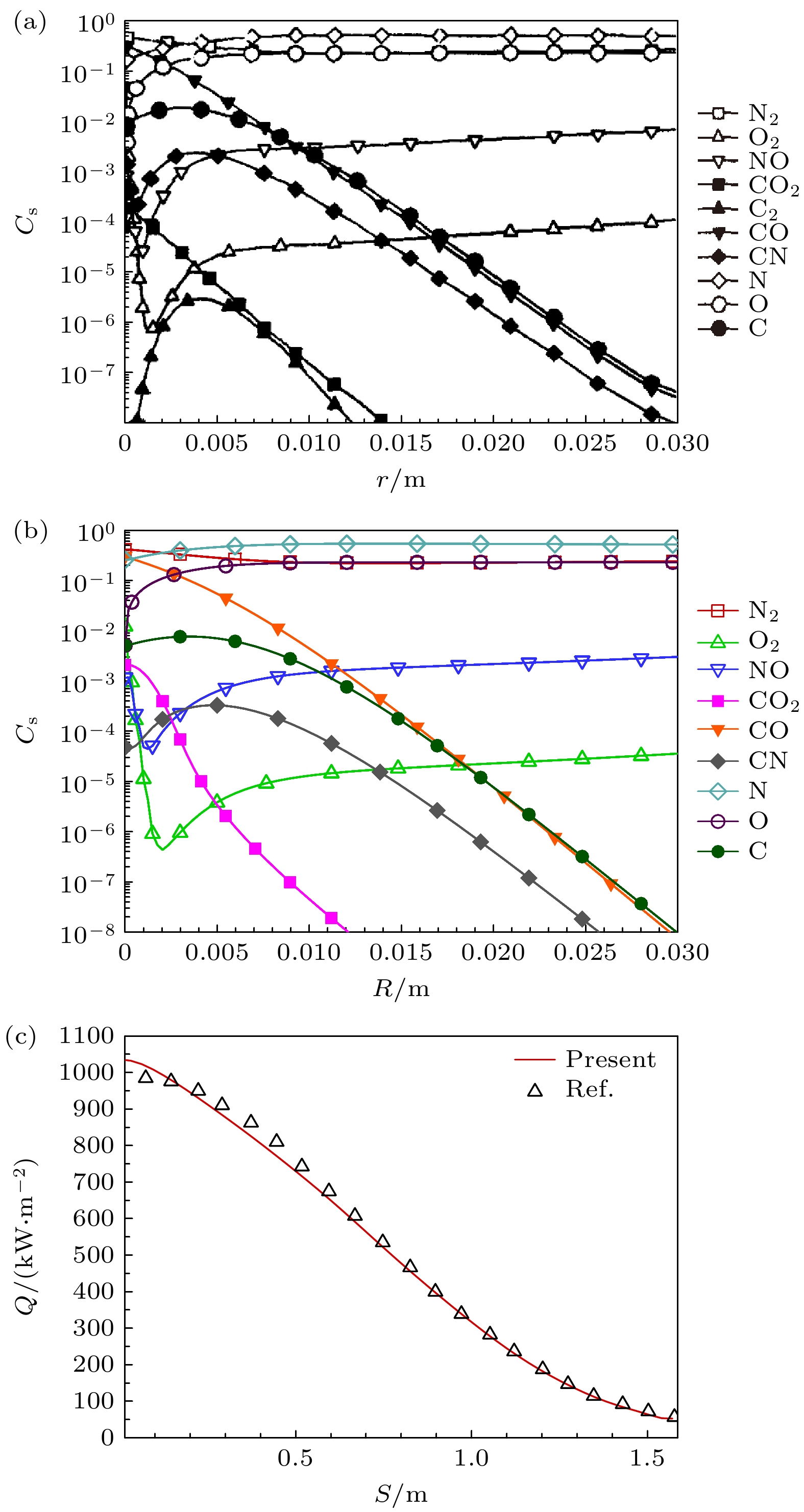
 下载:
下载:
